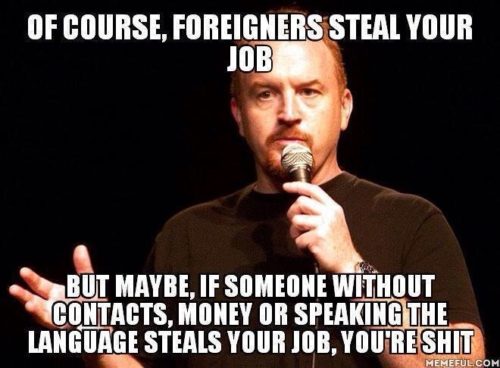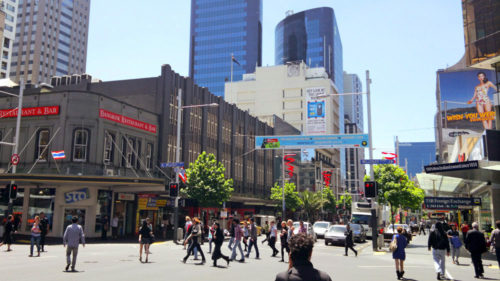
One statistic that many will find suprising is that there is a positive (if insignificant) correlation between having no religion and median age – this was 0.16. In other words, the average non-religious Kiwi is older than the average religious one.
There are some easy ways to misinterpret this trend so one has to be careful. One common way to misread it is that religion is growing in power again, by somehow having increased its appeal to the youth of today.
The reality is that the most strongly non-religious demographic is the group of Kiwis of European descent, and this group is also significantly older and larger than the other racial demographics.
The correlation between being of European descent and having no religion was 0.69, and because the correlation between being of European descent and median age was 0.72, we can already happily explain the correlation between no religion and median age.
With being Maori there was a positive but not significant correlation with having no religion – this was 0.13. Some might be surprised that this is not higher, as Maoris are not particularly religious compared to most other demographics.
At least part of the reason is that there are many Maori families with high numbers of children, or headed by solo mothers, in the lower sociodemographic groups that affiliate with Mormonism or the Jehovah’s Witnesses, and the children in these families will be counted as religious when they may well grow up not to be.
This can be seen if we look at the correlations between having no religion and being in certain age bands. With being aged between 0-4 and having no religion the correlation was -0.22, and with being aged between 5-14 and having no religion the correlation was -0.13. Obviously, children this young have not made the decision to adopt a religion but are simply counted as that of their parents or mother.
Predictably from this, there is a moderately strong correlation between being born in New Zealand and having no religion – this was 0.49.
So it is not surprising, then, that the correlation between being a Pacific Islander and having no religion is a very strong -0.81. This is not quite as strong as the correlation between being born in the Pacific Islands and having no religion: this was -0.86.
This tells us what many already know: that Pacific Island societies are almost entirely religious and that immigrating to New Zealand has the effect – if gradual – of eroding religious conditioning.
The correlation between being Asian and having no religion perfectly mirrored that of being born in New Zealand. Here it was -0.49. Because we can see that the correlation between having no religion and being born in North East Asia is only -0.15, we can guess that the bulk of these religious Asians are Hindus and Muslims from South Asia.
People with no religion were significantly more likely to be born in Britain. The correlation between having no religion and being born in Britain was 0.28.
As has been established in other countries, there is a positive correlation between having no religion and having educational aspirations. The correlation betwen having no religion and having a doctorate was 0.26, and with having an Honours degree it was 0.27. At the other end of the scale, the correlation between having no religion and having no qualification was -0.08.
Working in arts and recreation services was the industry where people are the most likely to not have a religion – the correlation between the two was a strong 0.60. This is probably because this is the industry that requires the most free and unique thought, and that has a negative correlation with religious sentiments.
Other industries working in which had high correlations with being non-religious were construction (0.46), retail trade (0.45), hospitality (0.42) and education and training (0.41).
The simplest way to explain all of these correlations is that they also overlap with being young adults, and the youth (leaving aside the reproduction rates of young solo mothers) are less likely to be religious.
This is not as evident in the numbers as it could be, of course, as has alraedy been explained by immigration patterns. The correlation between having no religion and being in the 15-19 age bracket is 0.02, and with being in the 20-29 age bracket it is 0.01.
These two age brackets correlate positively with being a Pacific Islander, so it’s possible to say that the general Western pattern of people becoming less religious with each passing generation holds true if one looks at Kiwis of European or Maori descent seperately from the confounding factor of recent immigration from a religious culture.
The religious hold true to another stereotype in that they breed at a significantly higher rate than the non-religious. The correlation between having no religion and being in a couple without a child was 0.49, compared to the correlation between having no religion and being in a couple with a child, which was -0.37, or being a solo parent (-0.33).
Perhaps also fitting with the general correlation with youth, the non-religious are significantly less likely to take a private car to work, and like to walk and bike. The correlation with having no religion and taking a private car to work was -0.50, and with walking to work it was 0.37 and with biking to work it was 0.32.
There is a significant correlation between having no religion and belonging to any of the income bands above $40K. The only income band to have a significant negative correlation with having no religion was the loss or no income band: here the correlation was -0.34.
Some might be surprised by the fact that there was a stronger correlation between having no religion and working as a manager (0.49) than there is between having no religion and working as a professional (0.33). The explanation for this might be that relatively more professionals than managers are immigrants and therefore have a nominal adherence to the religion of their ethnic origin.
Finally, the South Island is the godless island: the correlation between living on the South Island and having no religion was a significant 0.29. For the most part this simply reflects the fact that a much higher propertion of South Islanders are New Zealand-born compared to North Islanders.
*
This article is an excerpt from Understanding New Zealand, by Dan McGlashan, published by VJM Publishing in the winter of 2017.



